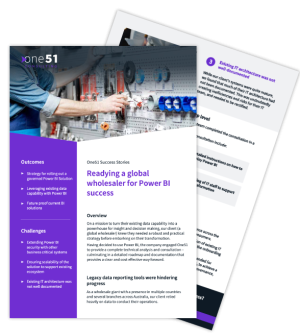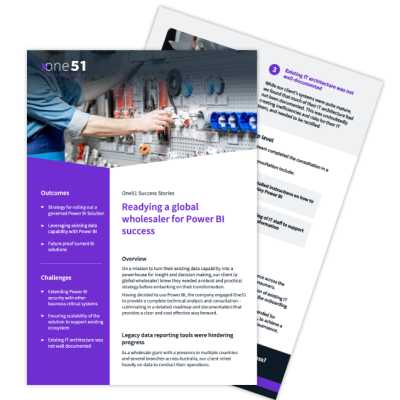

Overview
On a mission to turn their existing data capability into a powerhouse for insight and decision making, our client (a global wholesaler) knew they needed a robust and practical strategy before embarking on their transformation.
Having decided to use Power BI, the company engaged One51 to provide a complete technical analysis and consultation – culminating in a detailed roadmap and documentation that provides a clear and cost effective way forward.
Legacy data reporting tools were hindering progress
As a wholesale giant with a presence in multiple countries and several branches across Australia, our client relied heavily on data to conduct their operations.
Although their Australian arm had built out an impressive data capability within on-premise systems, their current method of spreadsheets and disparate reporting tools was hindering the level of insight they could achieve.
The company also wanted to empower business users by enabling self-service to relevant data for leadership, as well as staff in sales, finance, procurement, and warehouse and branch management.
While their internal IT team had begun experimenting with Power BI, they wisely decided not to move forward with a complete transformation until they were equipped with a well-planned strategy.
After developing a long list of goals and requirements, the company reached out to one51 for guidance.

Conducting a thorough technical analysis
One51’s team for this project included a Principal Consultant with extensive experience in Power BI, backed by technical leads and a project manager.
We kicked off by gaining a full understanding of what our client wanted to achieve, which included:
Readying the business to deploy Power BI
Assessing data security
Ensuring scale
Establishing data governance
Another key aspect of the project was the ability to integrate Power BI with existing business-critical IT systems.
Our team undertook an in-depth current state and gap analyses of the company’s operating environment, and examined challenges and opportunities in moving to the target state.
Working closely with their stakeholders, this groundwork resulted in 3 key outcomes:
While the client had assumed they would need to completely replace their current capability to implement Power BI, our review and testing showed this didn’t need to occur. This finding alone has saved the company significant time and money, given the extensive investment in building out their existing data capability over the past decade.

Power BI enterprise strategy
The gap analysis provided the activities and principles required for our client to reach this target state. It was reflected in a comprehensive strategy document covering and array of principles from governance to security to development life-cycle among others.

Ability to leverage existing data capability
Our team was impressed by the level of learned business logic in our client’s existing systems. With this and user experience in mind, we identified continual improvement strategies that would enable current systems to be uplifted to support future goals, from cloud migration to big data.

Opportunity to future proof current systems
While our client’s systems were quite mature, we found that much of their IT architecture had not been documented. This was undoubtedly creating inefficiencies and risks for their IT team, and needed to be rectified.
Immediate and unanimous approval at a Group level
A comprehensive roadmap for our client to achieve their Power BI vision
Recommendations for avoiding cost challenges while optimising value
Suggestions on the most appropriate Power BI tier level
Detailed instructions on how to deploy Power BI
Upskilling of IT staff to support the transformation

Get your free copy now
Want to achieve results like this in your business?
To speak with a one51 consultant, simply contact us.
